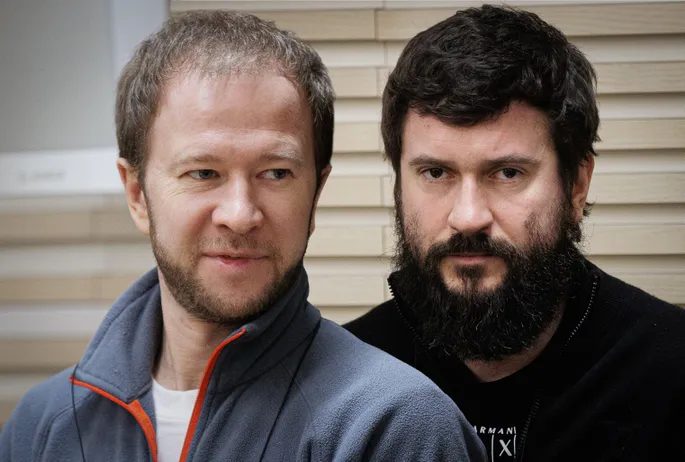HashFlare Founders Dodge Prison Time After $577M Crypto Scam—Victims Left Holding the Bag
Another day, another crypto exit scam—except this one's got a $577M price tag and a slap-on-the-wrist ending.
HashFlare's Ponzi architects walked free with time served, proving once again that white-collar crime pays (especially when it's dressed in blockchain buzzwords).
The takeaway? Always DYOR—unless you enjoy funding yacht parties for fraudsters.
 Sergei Potapenko and Ivan Turõgin (Source: Postimees)
Sergei Potapenko and Ivan Turõgin (Source: Postimees)
The $577 Million Mining Mirage
HashFlare marketed itself as a crypto mining service selling contracts that promised customers shares of profits from blockchain validation activities. Court documents revealed the operation used fake online dashboards showing false mining activity while lacking the computing capacity to mine the vast majority of the claimed cryptocurrency.
The duo’s equipment performed Bitcoin mining at less than one percent of its purported computing power, according to the Justice Department’s official press release.
When investors requested withdrawals, Potapenko and Turõgin either resisted payments or used newly purchased cryptocurrency rather than actual mining rewards.
The defendants diverted millions to purchase real estate, luxury vehicles, expensive jewelry, and over a dozen chartered private jet trips while victims suffered major losses.
Their scheme extended beyond HashFlare to include Polybius Bank, a fictitious “virtual currency bank” that raised $25 million through a 2017 ICO but never operated as an actual financial institution.
The 2023 arrests triggered complex extradition proceedings before Estonia approved their transfer to face U.S. charges in early 2024.
Both men pleaded guilty to conspiracy to commit wire fraud in February, agreeing to forfeit over $400 million in assets while facing a maximum 20-year sentence.
![]() Two Estonian nationals pleaded guilty in the US to operating “a massive, multi-faceted crypto Ponzi scheme that victimized hundreds of thousands of people” globally.#Crypto #CryptoScam #Fraudhttps://t.co/86BnJd3fj9
Two Estonian nationals pleaded guilty in the US to operating “a massive, multi-faceted crypto Ponzi scheme that victimized hundreds of thousands of people” globally.#Crypto #CryptoScam #Fraudhttps://t.co/86BnJd3fj9
“These defendants were operating a classic Ponzi scheme, involving a glitzy asset: a mirage of cryptocurrency mining,” said Acting U.S. Attorney Teal Luthy Miller.
Lenient Sentences Defy Emerging Pattern of Harsh Crypto Penalties
The HashFlare defendants’ 16-month sentences appear inconsistent with an intensifying judicial trend toward severe punishment for cryptocurrency crimes, regardless of a scheme’s size or complexity.
For instance, Nicholas Truglia’s sentence jumped from 18 months to 12 years for a $22 million SIM-swapping scheme after he failed to pay restitution, with the judge condemning his “splendor” lifestyle while owing victims millions.
Similarly, former rugby player Shane Moore was sentenced to 30 months for a $900,000 mining fraud, receiving nearly double the HashFlare defendants’ custody time for a scheme worth less than 0.2% of their operation.
The sentencing disparity becomes more pronounced when compared with non-crypto financial fraud cases, where defendants typically receive years-long sentences for schemes involving far smaller amounts than HashFlare’s half-billion-dollar operation.
Mohammed Azharuddin Chhipa received 30 years for funneling $185,000 in cryptocurrency to ISIS operatives, a sentence nearly twenty times longer than HashFlare’s founders despite involving vastly smaller amounts.
The contrast also extends beyond specific cases to prosecutorial approach, with Dwayne Golden receiving eight years for a $40 million Ponzi scheme and prosecutors seeking 20 years for former Celsius CEO Alex Mashinsky in a $550 million fraud case.
![]() Celsius founder Alex Mashinsky was sentenced to 12 years in prison for defrauding investors with false promises of high crypto returns.#Celsius #AlexMashinskyhttps://t.co/R4syyDiKaU
Celsius founder Alex Mashinsky was sentenced to 12 years in prison for defrauding investors with false promises of high crypto returns.#Celsius #AlexMashinskyhttps://t.co/R4syyDiKaU
Legal experts question whether the defendants’ cooperation, asset forfeiture, or other undisclosed factors influenced the unusually lenient outcome for such a massive international fraud.
However, the Justice Department’s consideration of an appeal suggests internal disagreement with the sentence’s proportionality, though appeals of criminal sentences face high legal hurdles and uncertain outcomes.

